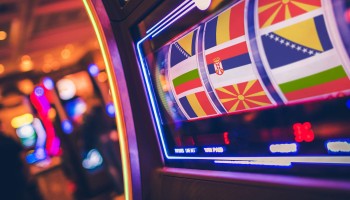Even with his teenage daughter in a coma, Krasimir Gorsov couldn’t walk away from the slot machines or keep his hands out of the pot of cash that paid for her doctors.
That much of Bulgaria and the sporting world was watching -- world figure skating champion Maxim Staviski had driven drunk and slammed into 17-year-old Manuela Gorsova’s car in 2007 -- didn’t deter him from stealing 50,000 Euros donated by people who just wanted to help the teenager and her family.
Krasimir Gorsov had a gambling problem, and Bugaria offered plenty of places to indulge.
His story is a look at a side of gambling obscured by the lure of the bet and the glitz of the casino.
Bulgaria and much of the Balkans are awash in gambling money and some taxes collected from casino operators are used to build roads, fund education and help otherwise struggling economies.
But the decade-long gambling boom has also led to a sharp increase in gambling addiction. A Bulgarian government study found that as many as 12 percent of all high school students are problem gamblers, and studies around Eastern Europe show similar trends.
A Haven for Addicts
Dejan Stojanović is the founder of Fund Herz in Serbia, which provides support and treatment for gambling addicts. He told reporters for the Organized Crime and Corruption Reporting Project that his operation has treated between 4,000 and 5,000 people since he opened his center four years ago.
One of them is a 26-year-old from Zrenjanin, whose first name is Saša. He said he lost tens of thousands of Euros gambling, mostly on slot machines and roulette. He started in his teenage years, mainly hoping to break out of poverty.
"Think of the situation through the head of a 16-year-old kid, who has only 500 dinars to spend on a night out, because his parents have no money," said Saša. The last names are not used to respect the addicted patients' nonymity. "If he enters the slot club and wins, he could have 10 times more cash to go to the city and spend."
Another patient at Fund Herz, 22-year-old Nenad from Belgrade, said he was an active gambler from the time he was 14. With all the money he lost gambling, he could have bought a flat in Belgrade, he said. "It was at the end of the elementary school. I started with sports betting... later, as time passed, I moved on to slot machines and at the end I was playing roulette," Nenad said in an interview. "As I got older, I played more. Big numbers, a few thousand Euros."
Chasing the Rush
According to Saša, gambling addicts are similar to drug addicts.
"Increasing the possibilities of profit increases the amount of adrenaline," he said, adding that, whether he won or lost, he never was able to sleep peacefully. "'When you win, you are just waiting for tomorrow to get back to the club. When you lose, you are just thinking how to get money.
"The only thing important is staying in the game," Nenad said.
To do that, many steal from friends and relatives.
"I used all possible ways to find money, things I'm not proud of, but it is my past," Saša said. "First, I was stealing money from parents. I started to steal the gold from the house. My mother and father had gold necklaces and some gold earrings and I took them."
When he couldn't find anything to steal, he'd borrow from friends. He never returned the money.
Eventually, he wound up with loan sharks.
Saša's parents forced him into treatment, and a particularly bad night at the gambling hall sent Nenad looking for help. Today, both say they are cured, and credit Stojanović and Fund Herz.
Others are not so fortunate, said Stojanović, himself a recovering gambling addict. Stojanović said he quit wen he saw a man pull out a gun at a casino and blow his brains out.
Five years later, he founded Fund Herz.
There aren't many places in the Balkans for addicts to turn for help. Many European countries, particularly Great Britain, devote millions of Euros in gambling taxes to treatment programs, but few Balkan countries do so. Serbia and Bulgaria devote nothing, while in Bosnia and Herzegovina (BiH), the Republika Srpska (RS) has mandatory funding for treatment, while the Federation of Bosnia and Herzegovina (FBiH) does not.
As for Gorsov, Bulgarian police charged him in March with stealing from his daughter's fund. In the past year, after a television news program filmed him gambling, he has tearfully admitted his addiction in press conferences and has asked for forgiveness.
His daughter is still under treatment but out of her coma, and Gorsov has promised never to gamble again.
Keeping that promise may be difficult, both Saša and Nenad said. They are worried that the urge will become too strong.
"A man can never be completely healed; he can only try to abstain during his whole life," said Nenad, who is now studying law. "I created an aversion, but who knows, maybe one day, 20 or 30 years from now, I will enter a casino to have fun and it will grow into a disaster."


